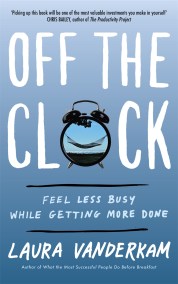The Link Between Happiness and Time

No matter how busy we think we are, it is possible to savour life’s best moments. With the right habits, we can live efficiently and effectively, and yet still see time as abundant. In this article, we explore time management expert Laura Vanderkam’s ideas about the link between happiness and time.
The Link Between Happiness and Time
When people say they want more time, what they often mean is that they want more memories. When people say they want more time, they also mean that they want more time spent doing things they are happy about. Few people would want more time tacked on to a prison sentence. Someone counting minutes as he’s stuck in a traffic jam might say he wants more time, but he wants more time outside his car, not inside it. Otherwise, why count the minutes? Time is just time, but we perceive it differently based on what we are doing, and our mental state.
The good news is that the proportion of time spent on things that are satisfying versus things that are less so may be changeable over time. People who feel like they have enough time for the things they want to do make strategic choices to optimize their time. This can mean creating time dividends: doing things now to open up space in the future. This article is likewise about paying in, with the goal of moving more moments into the “enjoyable” category. Often, this involves investing resources — money, for sure, but time is also a resource, and so is the mental energy required to develop a new worldview — in achieving happiness.
These three resources play their parts in different ways. Money is straightforward. Time is less so, though it can be a game changer: Mind-set is the least understood resource of all of these, though it is probably the most profound. Being able to switch from enduring to enjoying, from counting minutes to seeing them as tolerable, has huge implications for opening up time. In my time-perception survey, people who strongly agreed with the statement, ‘Yesterday, I spent my time in ways that made me happy’ were 22 percent more likely to agree that they generally had time for the things that they wanted to do in life. People in the top 20 percent of time-perception scores spent a higher proportion of their time on things that are known mood boosters — exercise, reflective activities, and interacting with friends and family — as opposed to people in the bottom 20 percent of time-perception scores, who spent more time online and watching TV. These are activities whose pleasures turn out not to do much for people in the long run.
In any case, people with all the time in the world know that happiness is a worthy goal. Because how we live our hours is how we live our lives, being happy with our lives means being happy with our hours. Whether those hours are spent in a Waffle House or elsewhere, strategic investments can help us consciously design our lives to make us relaxed about our time or, if not happy, at least less unhappy than we would be.
How Money Can Buy Happiness
While we all have the same 168 hours in a week, people do not have the same amount of money, and when people hear “invest,” that’s the topic that comes to mind first. Consequently, the usual narratives of money and privilege bubble up, though intriguingly these narratives are often at odds. Can money buy happiness, or does the evidence come down on the “more money, more problems” side of the ledger? Is it only helpful to a point of diminishing returns?
What I think it’s safest to say is that money is a tool. It will not automatically produce happiness, just as a hammer lying in a toolbox does nothing. Used strategically, it can enable a great deal. Where people go awry on the money and happiness question is that we misjudge the nature of happiness. To quote Tolstoy, “Pure and complete sorrow is as impossible as pure and complete joy.” Few good or bad bumps last long; we drift back to where we were. As my daughter observed to me in the car park after I’d succumbed to her pleas to buy a doll from the clearance rack, “When you get a new toy, you’re excited about it, but after a while, you don’t play with it anymore.” Purchases are most likely to make people happy if they enable enjoyable experiences, which can then become memories. These memories become ongoing fonts of pleasure, and are not subject to the same hedonic adaptation that plagues most seemingly pleasurable things in life. A tent buys happiness
if you use it to go camping, and then during your commute you recall those crisp nights and crimson leaves. If it sits in your basement because you never make the time to use it, it won’t.
Happiness can also be measured in many ways. There’s life satisfaction, which is how you think life is going overall. There’s nothing wrong with this measure, but one’s mood is more often determined by that spoiled child known as the experiencing self. People can become upset at this disconnect. You find yourself thinking, Of course I should be happy! I have a good job, a beautiful house. But if you wake too early to endure a miserable commute between that beautiful house and your good job, and then you come home to spend the evening scrolling through Instagram photos of other people’s slightly bigger and more beautiful houses, you will not feel blissful.
If we accept that moment‑by‑moment happiness is often driving our moods, then investing money strategically in producing happiness means understanding which activities induce happiness and which do not.
Ranking happiness
Studies of human happiness find that people are more likely to be in better moods during certain activities than during others. Sex, unsurprisingly, rates better than commuting to work. Indeed, the commute to work is, statistically, the low point of the average person’s day. Commuting home from work scores better, presumably because one arrives home at the end of it, a redeeming factor absent from the morning run. Other activities might depend on the person. Work in general does not score well, but this is often the hour‑by‑hour problem again. You can love your colleagues and believe deeply in your organization’s mission, and still find that Tuesday-morning staff meeting insufferable. Most people enjoy socializing and relaxing. Running errands in general scores low, but it depends on the errand. Some people really like grocery shopping, though many people dislike battling other shoppers in a crowded mega-store while trying to find a certain lightbulb that the store turns out not to carry. Childcare is likewise a mixed bag. Playing with kids can be fun. Refereeing sibling battles, not so much.
Investing money to achieve happiness requires analyzing pain points in how you spend your time, and figuring out what can be done about them. No one can truly make more time; once a second
is gone, all the money in the world cannot lure it back. Yet money can change the proportion of aggravation to contentment in a life. When you can reduce time spent on things you don’t enjoy doing— activities that have you counting the minutes, hoping they will be over soon — and
increase the time spent on things you do enjoy doing, then you will feel like you have more time.
When money can achieve this, then it is often money well spent.
This article is extracted from Off the Clock (Piatkus) by Laura Vanderkam, the bestselling author of What the Most Successful People Do Before Breakfast.
'Laura Vanderkam is one of the world's leading experts in time management and productivity . . . her insights in Off the Clock can change your life' - Dorie Clark, author of Stand Out
'Laura Vanderkam delivers a compelling and evidence-based argument that busyness is overrated in our current culture. Living a full life, at work and at home, is about doing the right things well, and confidently missing out on everything else' - Cal Newport, bestselling author of Deep Work
'I loved it . . . Vanderkam expertly weaves together interviews with experts, anecdotes about her own personal life, philosophical musings, and scientific research' - Shana Lebowitz, Business Insider UK
Learn to savour life's best moments - no matter how busy you are - through mindset shifts that alter your perception of time.
Laura Vanderkam, the acclaimed author of What the Most Successful People Do Before Breakfast, isn't like other time-management gurus. She's not trying to shave off 30 seconds here or there; she's interested in the emotional and psychological side of the 168 hours everyone has each week. Her message is that we all have more time than we think we do, and can feel less stressed while getting more done.
With the right habits, you can live efficiently and effectively, and yet still see time as abundant. For instance, Vanderkam teaches:
- How to clear your calendar of activities that are boring, stressful or simply not the best use of your time
- Why tackling your top priorities during the hours when you have the most energy will change your perception of what it means to be productive
- How to linger in great experiences while they're happening, and why good memories seem to make time expand
Packed with insights from busy yet relaxed professionals, including 'time makeovers' of people who are learning to use these tools, Off the Clock can inspire the rest of us to creative lives that are not only productive, but enjoyable in the moment.









